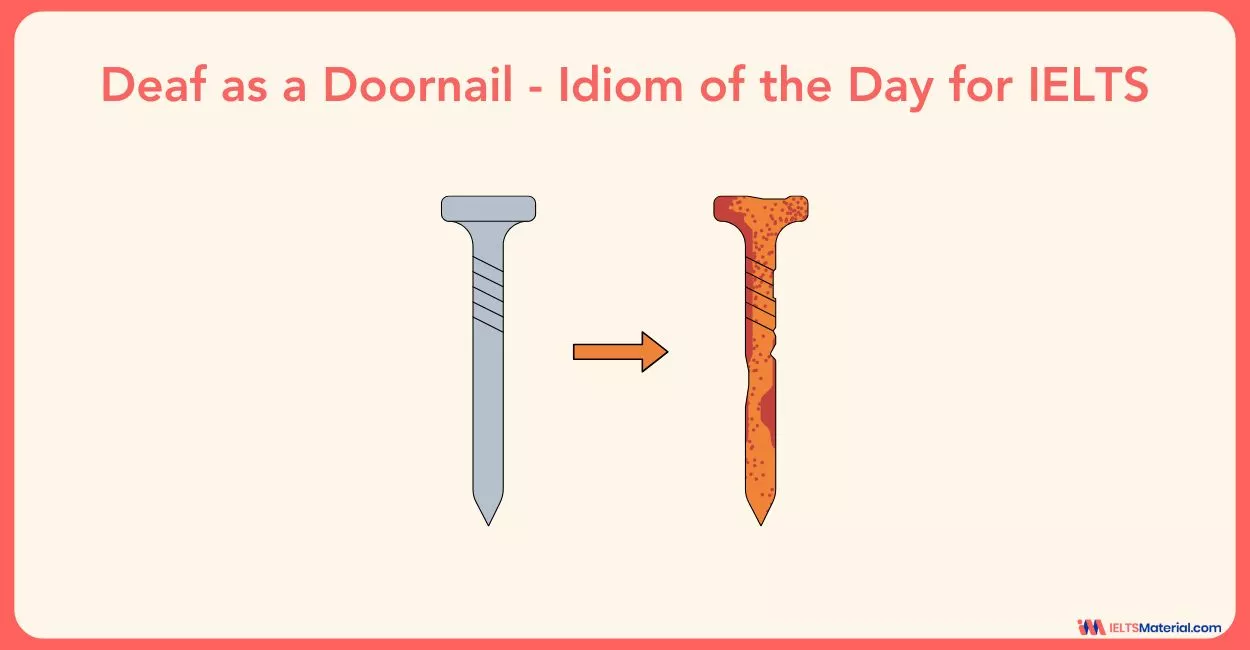Let Sleeping Dogs Lie Idiom: Meaning, Origin, Usage & Exercises
6 min read
Updated On
-
Copy link
The idiom ‘let sleeping dogs lie’ means ‘not getting involved (ignoring) and leaving the situation as it is’. Discover the meaning & origin of the idiom, along with examples and exercises created to improve your ability to use it & score 8+ on the IELTS.
Table of Contents

Limited-Time Offer : Access a FREE 10-Day IELTS Study Plan!
If you wish to achieve Band 7 and above, especially in the speaking module, it is mandatory to upgrade your word list with the latest IELTS Speaking vocabulary to boost your score and sound natural. In order to sound native-like, you have to use idioms, like ‘let sleeping dogs lie’, to add depth to your expression and opinion.
In this blog post, we will explore the meaning, origin, and usage of the idiom ‘let sleeping dogs lie’ and provide examples from the IELTS exam.
Before you move on to further details of this specific idiom, check out the video below to learn a few more idiomatic expressions that will help you achieve Band 8 and above.
Let Sleeping Dogs Lie Idiom: Meaning
The idiom ‘let sleeping dogs lie’ means to avoid restarting a conflict, problem, or discussion that has already been resolved, forgotten, or settled, especially when revisiting it could lead to unnecessary trouble or tension.
In simpler terms, it suggests, ‘Don’t bring up past issues that are better left alone’. It’s often used when someone is tempted to revisit an old argument, mistake, or sensitive topic.
Origin of Let Sleeping Dogs Lie Idiom
The idiom ‘Let sleeping dogs lie’ is a proverbial saying that was very popularly used in the 13th century to wake up the sleeping dogs, which may cause harm to the person who is waking up the sleeping dog.
One of its earliest known uses is in Geoffrey Chaucer’s works, and later in William Shakespeare’s plays. By the 1700s, the phrase had evolved into its modern idiomatic form, warning people against stirring up trouble unnecessarily.
Let Sleeping Dogs Lie Idiom Usage
The tone of ‘let sleeping dogs lie’ idiom is neutral to formal, making it appropriate for both casual and professional conversations. It conveys restraint and diplomacy, often implying that it's wiser to maintain peace than to stir up old problems.
Given below are some example sentences that show how the ‘let sleeping dogs lie’ idiom can be used appropriately.
- She thought of suggesting her ideas but decided to let sleeping dogs lie as the manager would disapprove of it
- I think it’s better to let sleeping dogs lie instead of talking about the previous day’s argument.
- Rose remained silent and decided to let sleeping dogs lie, instead of quarrelling
- Jack wanted to express her feelings but then decided to let sleeping dogs lie.
- Don’t ask him about the incident again. It’s better to let sleeping dogs lie.
Usage of Let Sleeping Dogs Lie Idiom in Scenarios
Scenario 1:
- Rose: I feel really sad for that older woman as those men are mistreating her. Do you think that we should help her?
- John: Although I feel sorry for her, it’s better to let sleeping dogs lie as these men seem to be rough and boisterous.
Scenario 2:
- Keith: I think I should help John prepare for the exams; this, unfortunately, is his 5th attempt.
- Rose: Yes, Poor boy, I feel so bad for him
- Keith: That’s why I have decided to coach him!
- Rose: Although it’s a great idea, it’s better to let sleeping dogs lie, as his parents may not like our interference in their son’s life.
- Keith: Oh, okay! Then I will drop the idea.
Are you looking for expert guidance on vocabulary building for IELTS?
Book an IELTS online class & talk to our experts NOW!
Let Sleeping Dogs Lie Idiom: Synonyms and Related Phrases
Given below are some phrases and common English words used in IELTS Speaking test related to the idiom, let sleeping dogs lie.
|
Idiom/Phrase |
Meaning |
Example Sentence |
|---|---|---|
|
Don’t stir the pot |
avoid creating unnecessary drama or conflict |
He enjoys gossiping just to stir the pot, even when everything is calm at work. |
|
Leave well enough alone |
don’t try to improve something that’s already working |
The website is functioning perfectly—let’s leave well enough alone. |
|
Bury the hatchet |
make peace and forget past grievances |
After years of rivalry, the two politicians finally buried the hatchet. |
|
Open a can of worms |
bring up a topic that leads to more problems |
Mentioning unpaid taxes during the audit opened a real can of worms. |
|
Dig up old wounds |
revisit painful or sensitive past issues |
Talking about the accident just digs up old wounds she’s trying to heal from. |
Boost your IELTS vocabulary and achieve success with our free online webinars.
Let Sleeping Dogs Lie Idiom: Detailed Usage in IELTS Contexts
Now, it is time to explore how the ‘let sleeping dogs lie’ idiom can be applied effectively across various IELTS exam contexts, with sample answers tailored to common topics.
Cue Card Example
- Topic: Describe a time when you chose not to argue with someone.
- Answer Excerpt: “A few months ago, I had a small disagreement with a close friend about a group project we were doing at university. He forgot to complete his part of the work, and although it put pressure on the rest of us, the project still turned out well in the end. I thought about bringing it up afterward, but I realised it might create tension and wasn’t really worth it. So, I decided to let sleeping dogs lie.”
IELTS Speaking Part 3 – Relationships
Question: Do you think people should always confront each other when there’s a problem?
Sample Answer: "Not always. In some cases, especially when the issue is minor or already resolved, it’s wiser to let sleeping dogs lie. Constant confrontation might damage relationships unnecessarily. Sometimes, bringing up past mistakes only reopens emotional wounds and causes resentment. It's often more mature to focus on the present and move forward instead of revisiting every disagreement."
Let Sleeping Dogs Lie Idiom: Practice Exercises
Below you will find some exercises that will help you improve your understanding and application of the idiom ‘let sleeping dogs lie’, allowing for appropriate usage in different contexts.
Exercise A: Choose the correct option.
1 In which scenario does ‘let sleeping dogs lie’ make the MOST sense?
A Discussing your achievements in a job interview
B Reopening a resolved family dispute at dinner
C Asking a friend for travel advice
D Reporting lost luggage at an airport
2 What does the speaker mean here: ‘Although I could’ve told him what really happened, I chose to let sleeping dogs lie’.
A The speaker told the truth.
B The speaker ignored the situation completely.
C The speaker avoided discussing a past issue to prevent conflict.
D The speaker forgot what happened.
Exercise B: Rewrite the sentences with ‘let sleeping dogs lie’.
1 Even though the matter was over, she kept bringing up the past, which caused more problems.
2 He didn’t want to reopen the argument they had last month, so he stayed silent.
3 I was tempted to bring up the mistake during the meeting, but I figured it would only cause more trouble.
Let Sleeping Dogs Lie Idiom: Answer Keys for Practice Exercises
|
Exercise A |
Exercise B |
|---|---|
|
1. B – It’s about avoiding old arguments that could create tension again. 2. C - The idiom implies a conscious choice to avoid conflict. |
1. She should’ve let sleeping dogs lie instead of bringing up the past again. 2. He chose to let sleeping dogs lie, so he stayed silent. 3. I was tempted to bring up the mistake during the meeting, but I decided to let sleeping dogs lie. |
To conclude, the idiom ‘let sleeping dogs lie’ is a formal expression perfect for IELTS contexts involving conflict, peacekeeping, or emotional intelligence. It shows you can express complex ideas idiomatically, a skill that examiners reward in the IELTS exam. Therefore, by mastering idioms like this, along with knowing when and how to use them, you can significantly improve your IELTS vocabulary and sound more like a natural, thoughtful English speaker.
Useful Links:
- To Go Pear-Shaped Idiom: Meaning, Origin, Usage & Exercises
- Jump for Joy – Idiom of the Day for IELTS Speaking with Meaning, Examples & Practice
- Through and Through - Idiom of the Day for IELTS
- Useful Resources & Websites for IELTS Vocabulary
- The More You Read, The Better You Write: Band 8+ Tip for IELTS Writing
- Mind Maps to Improve Your IELTS Vocabulary
Explore IELTS Resources

Start Preparing for IELTS: Get Your 10-Day Study Plan Today!
Check out other Idioms

Haniya Yashfeen

Haniya Yashfeen
Recent Articles

Kasturika Samanta

Prity Mallick

Nehasri Ravishenbagam







Post your Comments